- Home
- Pat Conroy
The Prince of Tides Page 2
The Prince of Tides Read online
Page 2
In a mental hospital in New York I visited Savannah after her second suicide attempt. I leaned down to kiss her on both cheeks, European style. Then, staring into her exhausted eyes, I asked her the series of questions I always asked whenever we met after a long separation.
“What was your family life like, Savannah?” I asked, pretending I was conducting an interview.
“Hiroshima,” she whispered.
“And what has life been like since you left the warm, abiding bosom of your nurturing, close-knit family?”
“Nagasaki,” she said, a bitter smile on her face.
“You’re a poet, Savannah,” I said, watching her. “Compare your family to a ship.”
“The Titanic.”
“Name the poem, Savannah, you wrote in honor of your family.”
“ ‘The History of Auschwitz.’ ” And we both laughed.
“Now, here’s the important question,” I said, leaning down and whispering softly in her ear. “Whom do you love more than anyone in the world?”
Savannah’s head lifted up from the pillow and her blue eyes blazed with conviction as she said between cracked, pale lips, “I love my brother, Tom Wingo. My twin. And whom does my brother love more than anyone else in the world?”
I said, holding her hand, “I love Tom the best too.”
“Don’t answer wrong again, wise-ass,” she said weakly.
I looked into her eyes and held her head with my hands, and with my voice breaking and tears rolling down my cheeks, I almost broke apart as I gasped, “I love my sister, the great Savannah Wingo from Colleton, South Carolina.”
“Hold me tight, Tom. Hold me tight.”
Such were the passwords of our lives.
This has not been an easy century to endure. I entered the scene in the middle of a world war at the fearful dawning of the atomic age. I grew up in South Carolina, a white southern male, well trained and gifted in my hatred of blacks when the civil rights movement caught me outside and undefended along the barricades and proved me to be both wicked and wrong. But I was a thinking boy, a feeling one, sensitive to injustice, and I worked hard to change myself and to play a small, insignificant part in that movement—and soon I was feeling superabundantly proud of myself. Then I found myself marching in an all-white, all-male ROTC program in college and was spit on by peace demonstrators who were offended by my uniform. Eventually I would become one of those demonstrators, but I never spit on anyone who disagreed with me. I thought I would enter my thirties quietly, a contemplative man, a man whose philosophy was humane and unassailable, when the women’s liberation movement bushwhacked me on the avenues and I found myself on the other side of the barricades once again. I seem to embody everything that is wrong with the twentieth century.
It was my sister who forced me to confront my century and who finally freed me to face up to the reality of those days beside the river. I had lived life in the shallows for too long and she led me gently toward the deeper waters where all the bones, wreckage, and black hulks awaited my hesitant inspection.
The truth is this: Things happened to my family, extraordinary things. I know families who live out their entire destinies without a single thing of interest happening to them. I have always envied those families. The Wingos were a family that fate tested a thousand times and left defenseless, humiliated, and dishonored. But my family also carried some strengths into the fray, and these strengths let almost all of us survive the descent of the Furies. Unless you believe Savannah; it is her claim that no Wingo survived.
I will tell you my story.
Nothing is missing.
I promise you.
1
It was five o’clock in the afternoon Eastern Standard Time when the telephone rang in my house on Sullivans Island, South Carolina. My wife, Sallie, and I had just sat down for a drink on the porch overlooking Charleston Harbor and the Atlantic. Sallie went in to answer the telephone and I shouted, “Whoever it is, I’m not here.”
“It’s your mother,” Sallie said, returning from the phone.
“Tell her I’m dead,” I pleaded. “Please tell her I died last week and you’ve been too busy to call.”
“Please speak to her. She says it’s urgent.”
“She always says it’s urgent. It’s never urgent when she says it’s urgent.”
“I think it’s urgent this time. She’s crying.”
“When Mom cries, it’s normal. I can’t remember a day when she hasn’t been crying.”
“She’s waiting, Tom.”
As I rose to go to the phone, my wife said, “Be nice, Tom. You’re never very nice when you talk to your mother.”
“I hate my mother, Sallie,” I explained. “Why do you try to kill the small pleasures I have in my life?”
“Just listen to Sallie and be very nice.”
“If she says she wants to come over tonight, I’m going to divorce you, Sallie. Nothing personal, but it’s you who’s making me answer the phone.”
“Hello, Mother dear,” I said cheerfully into the receiver, knowing that my insincere bravado never fooled my mother.
“I’ve got some very bad news, Tom,” my mother said.
“Since when did our family produce anything else, Mom?”
“This is very bad news. Tragic news.”
“I can’t wait to hear it.”
“I don’t want to tell you on the phone. May I come over?”
“If you want to.”
“I want to only if you want me to come.”
“You said you wanted to come. I didn’t say I wanted you to come.”
“Why do you want to hurt me at a time like this?”
“Mom, I don’t know what kind of a time it is. You haven’t told me what’s wrong. I don’t want to hurt you. Come on over and we can bare our fangs at each other for a little while.”
I hung up the phone and screamed out at the top of my lungs, “Divorce!”
Waiting for my mother, I watched as my three daughters gathered shells on the beach in front of the house. They were ten, nine, and seven, two brown-haired girls divided by one blonde, and their ages and size and beauty always startled me; I could measure my own diminishment with their sunny ripening. You could believe in the birth of goddesses by watching the wind catch their hair and their small brown hands make sweet simultaneous gestures to brush the hair out of their eyes as their laughter broke with the surf. Jennifer called to the other two as she lifted a conch shell up to the light. I stood and walked over to the railing where I saw a neighbor who had stopped to talk to the girls.
“Mr. Brighton,” I called, “could you make sure the girls are not smoking dope on the beach again?”
The girls looked up and, waving goodbye to Mr. Brighton, ran through the dunes and sea oats up to the house. They deposited their collection of shells on the table where my drink sat.
“Dad,” Jennifer, the oldest, said, “you’re always embarrassing us in front of people.”
“We found a conch, Dad,” Chandler, the youngest, squealed. “He’s alive.”
“It is alive,” I said, turning the shell over. “We can have it for dinner tonight.”
“Oh, gross, Dad,” Lucy said. “Great meal. Conch.”
“No,” the smallest girl said. “I’ll take it back to the beach and put it in the water. Think how scared that conch is hearing you say you want to eat him.”
“Oh, Chandler,” said Jennifer. “That’s so ridiculous. Conchs don’t speak English.”
“How do you know, Jennifer?” Lucy challenged. “You don’t know everything. You’re not the queen of the whole world.”
“Yeah,” I agreed. “You’re not the queen of the whole world.”
“I wish I had two brothers,” Jennifer said.
“And we wish we had an older brother,” Lucy answered in the lovely fury of the blonde.
“Are you going to kill that ugly ol’ conch, Dad?” Jennifer asked.
“Chandler will be mad.”
�
��No, I’ll take it back down to the beach. I can’t take it when Chandler calls me a murderer. Everyone into Daddy’s lap.”
The three girls halfheartedly arranged their lovely, perfectly shaped behinds on my thighs and knees and I kissed each one of them on the throat and the nape of the neck.
“This is the last year we’re going to be able to do this, girls. You’re getting huge.”
“Huge? I’m certainly not getting huge, Dad,” Jennifer corrected.
“Call me Daddy.”
“Only babies call their fathers Daddy.”
“Then I’m not going to call you Daddy either,” Chandler said.
“I like being called Daddy. It makes me feel adored. Girls, I want to ask you a question and I want you to answer with brutal honesty. Don’t spare Daddy’s feelings, just tell me what you think from the heart.”
Jennifer rolled her eyes and said, “Oh, Dad, not this game again.”
I said, “Who is the greatest human being you’ve encountered on this earth?”
“Mama,” Lucy answered quickly, grinning at her father.
“Almost right,” I replied. “Now let’s try it again. Think of the most splendid, wonderful person you personally know. The answer should spring to your lips.”
“You!” Chandler shouted.
“An angel. A pure, snow-white angel, and so smart. What do you want, Chandler? Money? Jewels? Furs? Stocks and bonds? Ask anything, darling, and your loving Daddy will get it for you.”
“I don’t want you to kill the conch.”
“Kill the conch! I’m going to send this conch to college, set it up in business.”
“Dad,” Jennifer said, “we’re getting too old for you to tease us like this. You’re starting to embarrass us around our friends.”
“Like whom?”
“Johnny.”
“That gum-snapping, pimple-popping, slack-jawed little cretin?”
“He’s my boyfriend,” Jennifer said proudly.
“He’s a creep, Jennifer,” Lucy added.
“He’s a lot better than that midget you call a boyfriend,” Jennifer shot back.
“I’ve warned you about boys, girls. They’re all disgusting, filthy-minded, savage little reprobates who do nasty things like pee on bushes and pick their noses.”
“You were a little boy once,” Lucy said.
“Ha! Can you imagine Dad as a little boy?” Jennifer said. “What a laugh.”
“I was different. I was a prince. A moonbeam. But I’m not going to interfere with your love life, Jennifer. You know me, I’m not going to be one of those tiresome fathers who’re never satisfied with guys his daughters bring home. I’m not going to interfere. It’s your choice and your life. You can marry anyone you want to, girls, as soon as y’all finish medical school.”
“I don’t want to go to medical school,” said Lucy. “Do you know that Mama has to put her fingers up people’s behinds? I want to be a poet, like Savannah.”
“Ah, marriage after your first book of poems is published. I’ll compromise. I’m not a hard man.”
“I can get married anytime I want to,” Lucy said stubbornly. “I won’t have to ask your permission. I’ll be a grownup woman.”
“That’s the spirit, Lucy,” I applauded. “Don’t listen to a thing your parents say. That’s the only rule of life I want you to be sure and follow.”
“You don’t mean that. You’re just talking, Daddy,” Chandler said, leaning her head back under my chin. “I mean Dad,” she corrected herself.
“Remember what I told you. Nobody told me this kind of stuff when I was a kid,” I said seriously, “but parents were put on earth for the sole purpose of making their children miserable. It’s one of God’s most important laws. Now listen to me. Your job is to make me and Mama believe that you’re doing and thinking everything we want you to. But you’re really not. You’re thinking your own thoughts and going out on secret missions. Because Mama and I are screwing you up.”
“How are you screwing us up?” Jennifer asked.
“He embarrasses us in front of our friends,” Lucy suggested.
“I do not. But I know we’re screwing you up a little bit every day. If we knew how we were doing it, we’d stop. We wouldn’t do it ever again, because we adore you. But we’re parents and we can’t help it. It’s our job to screw you up. Do you understand?”
“No,” they agreed in a simultaneous chorus.
“Good,” I said, taking a sip of my drink. “You’re not supposed to understand us. We’re your enemies. You’re supposed to wage guerrilla warfare against us.”
“We’re not gorillas,” Lucy said primly. “We’re little girls.”
Sallie returned to the porch, wearing an off-white sundress and sandals to match. Her long legs were tanned and pretty.
“Did I interrupt the complete lectures of Dr. Spock?” she said, smiling at the children.
“Dad told us we were gorillas,” explained Chandler, removing herself from my lap and mounting her mother’s.
“I cleaned up some for your mother,” Sallie said, lighting a cigarette.
“You’ll die of cancer if you keep smoking that, Mama,” Jennifer said. “You’ll choke on your own blood. We learned that at school.”
“No more school for you,” Sallie said, exhaling.
“Why’d you clean up?” I asked.
“Because I hate the way she looks at my house when she comes over. She always looks like she wants to inoculate the children for typhus when she sees the mess in the kitchen.”
“She’s just jealous that you’re a doctor and she peaked out after winning a spelling bee in third grade. So you don’t need to clean up everytime she comes over to spread plague. You just need to burn the furniture and spray with disinfectant when she leaves.”
“You’re a bit hard on your mother, Tom. She’s trying to be a good mother again, in her own way,” Sallie said, studying Chandler’s hair.
Jennifer said, “Why don’t you like Grandma, Dad?”
“Who says I don’t like Grandma?”
Lucy added, “Yeah, Dad, why do you always scream out ‘I’m not here’ when she calls on the phone?”
“It’s a protective device, sweetheart. Do you know how a blowfish puffs up when there’s danger? Well, it’s the same thing when Grandma calls. I puff up and shout that I’m not here. It would work great except that your mother always betrays me.”
“Why don’t you want her to know you’re here, Daddy?” Chandler asked.
“Because then I have to talk to her. And when I talk to her it reminds me of being a child and I hated my childhood. I’d rather have been a blowfish.”
Lucy asked, “Will we shout ‘I’m not here’ when you call us when we’re all grown up?”
“Of course,” I said with more vehemence than I intended. “Because then I’ll be making you feel bad by saying, ‘Why don’t I ever see you, dear?’ or ‘Have I done something wrong, darling?’ or ‘My birthday was last Thursday,’ or ‘I’m having a heart transplant next Tuesday. I’m sure you don’t care,’ or ‘Could you at least come over and dust off the iron lung?’ After you grow up and leave me, kids, my only duty in the world will be to make you feel guilty. I’ll try to ruin your lives.”
“Dad thinks he knows everything,” Lucy said to Sallie, and two cooler heads nodded in agreement.
“What’s this? Criticism from my own children? My own flesh and blood noticing flaws in my character? I can stand anything but criticism, Lucy.”
“All our friends think Dad is crazy, Mama,” Jennifer added. “You act like a mom is supposed to act. Dad doesn’t act like other dads.”
“Here it is. That dreaded moment when my children turn on me and rip my guts out. If this were Russia, they’d turn me in to the Communist authorities and I’d be in a Siberian salt mine, freezing my ass off.”
“He said a bad word, Mama,” Lucy said.
“Yes, dear. I heard.”
“Grass,” I said quickly. “
The grass needs cutting.”
“The grass always needs cutting when he says that word,” Jennifer explained.
“At this very moment my mother is crossing the Shem Creek bridge. No birds sing on the planet when my mother is on her way.”
“Just try to be nice, Tom,” Sallie said in her maddening professional voice. “Don’t let her get under your skin.”
I groaned, drinking deeply. “My God, I wonder what she wants. She only comes here when she can ruin my life in some small way. She’s a tactician of the ruined life. She could give seminars on the subject. She said she has some bad news. When my family has bad news, it’s always something grisly, Biblical, lifted straight out of the Book of Job.”
“At least admit your mother’s trying to be your friend again.”
“I admit it. She is trying,” I said wearily. “I liked her better when she wasn’t trying, when she was an unrepentant monster.”
“What’s for dinner tonight, Tom?” Sallie asked, changing the subject. “Something smells wonderful.”
“That’s fresh bread. I caught flounder off the rocks early this morning, so I stuffed them with crabmeat and shrimp. There’s a fresh spinach salad plus sautéed zucchini and shallots.”
“Wonderful,” she said. “I shouldn’t be drinking this. I’m on call tonight.”
“I’d rather have fried chicken,” Lucy said. “Let’s go out to Colonel Sanders.”
“Why do you cook anyway, Dad?” Jennifer asked suddenly. “Mr. Brighton laughs when he talks about your cooking dinner for Mama.”
“Yeah,” Lucy added, “he says it’s because Mama makes twice as much money as you do.”
“That rotten bastard,” Sallie whispered between clenched teeth.
“That’s not true,” I said. “I do it because Mama makes four or five times more money than I do.”
“Remember, girls, it was Daddy who put me through medical school. And don’t hurt your father’s feelings like that again, Lucy,” Sallie warned. “You don’t have to repeat everything Mr. Brighton says. Your father and I try to share the household chores.”
“All the other mommies I know cook for their family,” Jennifer said boldly, considering the bitter look that had entered Sallie’s gray eyes. “Except you.”

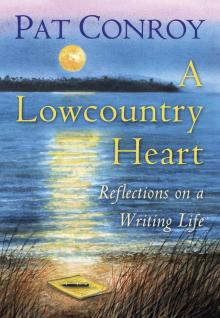 A Lowcountry Heart: Reflections on a Writing Life
A Lowcountry Heart: Reflections on a Writing Life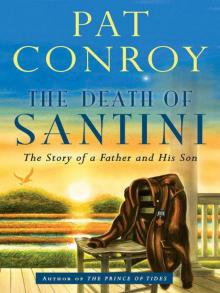 The Death of Santini: The Story of a Father and His Son
The Death of Santini: The Story of a Father and His Son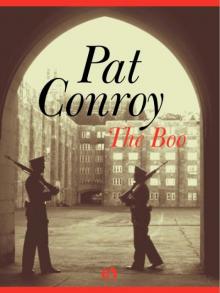 The Boo
The Boo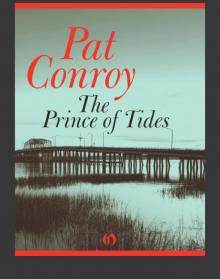 The Prince of Tides
The Prince of Tides Beach Music
Beach Music The Water Is Wide
The Water Is Wide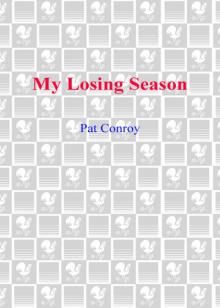 My Losing Season
My Losing Season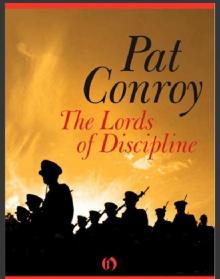 The Lords of Discipline
The Lords of Discipline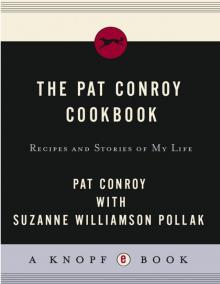 Pat Conroy Cookbook
Pat Conroy Cookbook My Reading Life
My Reading Life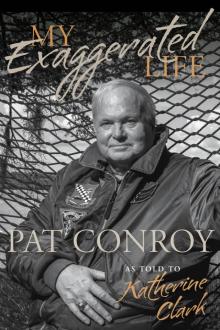 My Exaggerated Life
My Exaggerated Life The Pat Conroy Cookbook
The Pat Conroy Cookbook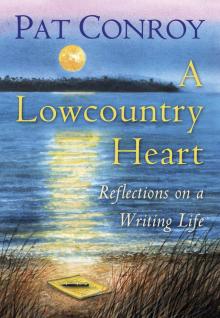 A Lowcountry Heart
A Lowcountry Heart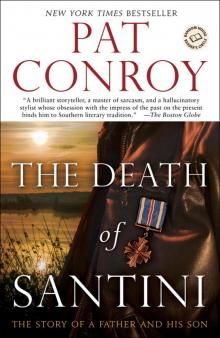 The Death of Santini
The Death of Santini